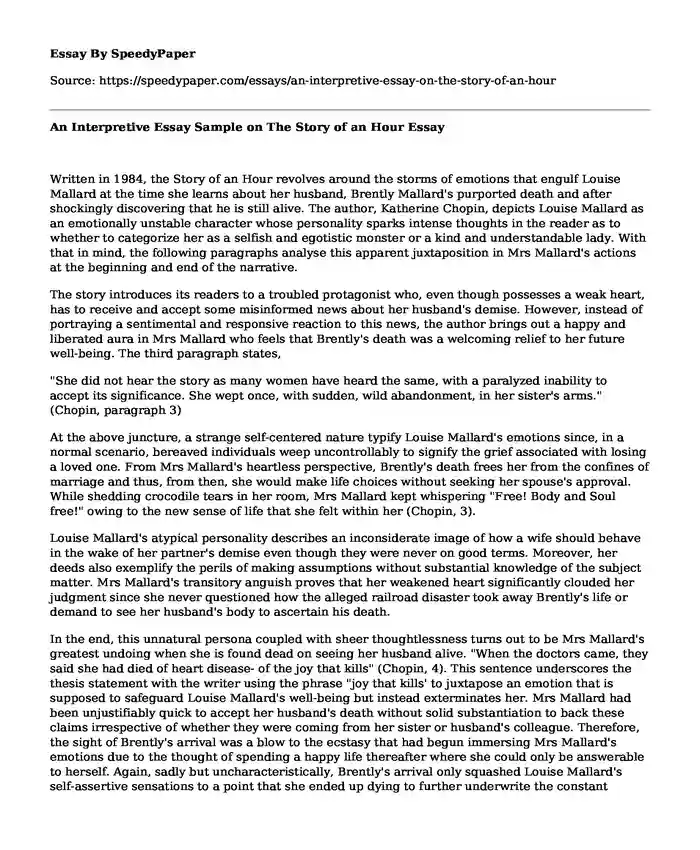
| Type of paper: | Essay |
| Categories: | Kate Chopin The Story of An Hour |
| Pages: | 3 |
| Wordcount: | 634 words |
Written in 1984, the Story of an Hour revolves around the storms of emotions that engulf Louise Mallard at the time she learns about her husband, Brently Mallard's purported death and after shockingly discovering that he is still alive. The author, Katherine Chopin, depicts Louise Mallard as an emotionally unstable character whose personality sparks intense thoughts in the reader as to whether to categorize her as a selfish and egotistic monster or a kind and understandable lady. With that in mind, the following paragraphs analyse this apparent juxtaposition in Mrs Mallard's actions at the beginning and end of the narrative.
The story introduces its readers to a troubled protagonist who, even though possesses a weak heart, has to receive and accept some misinformed news about her husband's demise. However, instead of portraying a sentimental and responsive reaction to this news, the author brings out a happy and liberated aura in Mrs Mallard who feels that Brently's death was a welcoming relief to her future well-being. The third paragraph states,
"She did not hear the story as many women have heard the same, with a paralyzed inability to accept its significance. She wept once, with sudden, wild abandonment, in her sister's arms." (Chopin, paragraph 3)
At the above juncture, a strange self-centered nature typify Louise Mallard's emotions since, in a normal scenario, bereaved individuals weep uncontrollably to signify the grief associated with losing a loved one. From Mrs Mallard's heartless perspective, Brently's death frees her from the confines of marriage and thus, from then, she would make life choices without seeking her spouse's approval. While shedding crocodile tears in her room, Mrs Mallard kept whispering "Free! Body and Soul free!" owing to the new sense of life that she felt within her (Chopin, 3).
Louise Mallard's atypical personality describes an inconsiderate image of how a wife should behave in the wake of her partner's demise even though they were never on good terms. Moreover, her deeds also exemplify the perils of making assumptions without substantial knowledge of the subject matter. Mrs Mallard's transitory anguish proves that her weakened heart significantly clouded her judgment since she never questioned how the alleged railroad disaster took away Brently's life or demand to see her husband's body to ascertain his death.
In the end, this unnatural persona coupled with sheer thoughtlessness turns out to be Mrs Mallard's greatest undoing when she is found dead on seeing her husband alive. "When the doctors came, they said she had died of heart disease- of the joy that kills" (Chopin, 4). This sentence underscores the thesis statement with the writer using the phrase "joy that kills' to juxtapose an emotion that is supposed to safeguard Louise Mallard's well-being but instead exterminates her. Mrs Mallard had been unjustifiably quick to accept her husband's death without solid substantiation to back these claims irrespective of whether they were coming from her sister or husband's colleague. Therefore, the sight of Brently's arrival was a blow to the ecstasy that had begun immersing Mrs Mallard's emotions due to the thought of spending a happy life thereafter where she could only be answerable to herself. Again, sadly but uncharacteristically, Brently's arrival only squashed Louise Mallard's self-assertive sensations to a point that she ended up dying to further underwrite the constant mystery surrounding this story.
Based on the explication above, it is clear that Mrs Mallard exhibits a combination of unusual comportments and behaviors that create both thoughtful and hard-hearted impressions about her in the reader. From an ethical dimension, this storyline warns the reader against making conclusions naively without verifying the credibility of statements or opinions from others. In this line, exercising calmness lays the foundation for making sound decisions in a situation where strong and unstable emotions would impede one's rationality.
Works Cited
Chopin, Katherine. "The Story of An Hour." (2001).
Cite this page
An Interpretive Essay Sample on The Story of an Hour. (2022, Jun 06). Retrieved from https://speedypaper.com/essays/an-interpretive-essay-on-the-story-of-an-hour
Request Removal
If you are the original author of this essay and no longer wish to have it published on the SpeedyPaper website, please click below to request its removal:
- Is Healthcare a Right? The Answer Is in Our Free Essay
- Free Essay Sample on School Shootings
- Essay Sample on the Summary of the Article SLEEP
- Child Interview Essay Example
- Free Essay Sample: Weaknesses and Threats of Southwest Airline
- Essay Sample Dedicated to the Evolution of Microprocessors
- Essay Sample on Boko Haram Terrorist Group
Popular categories




